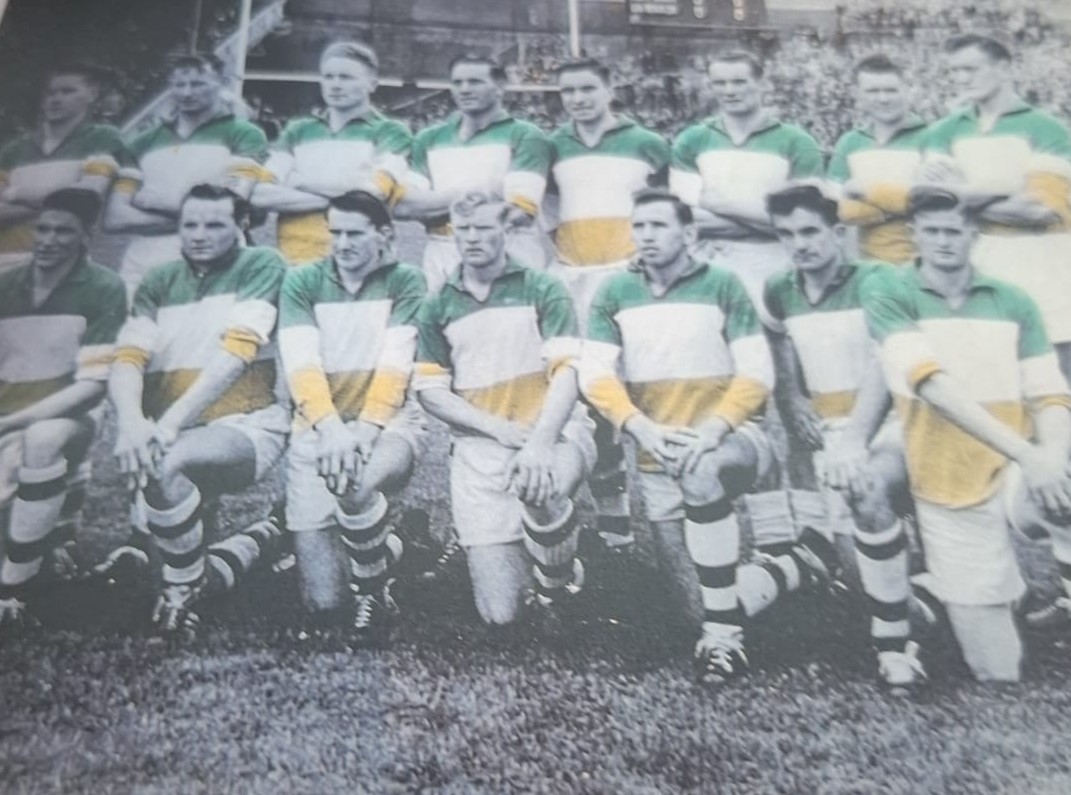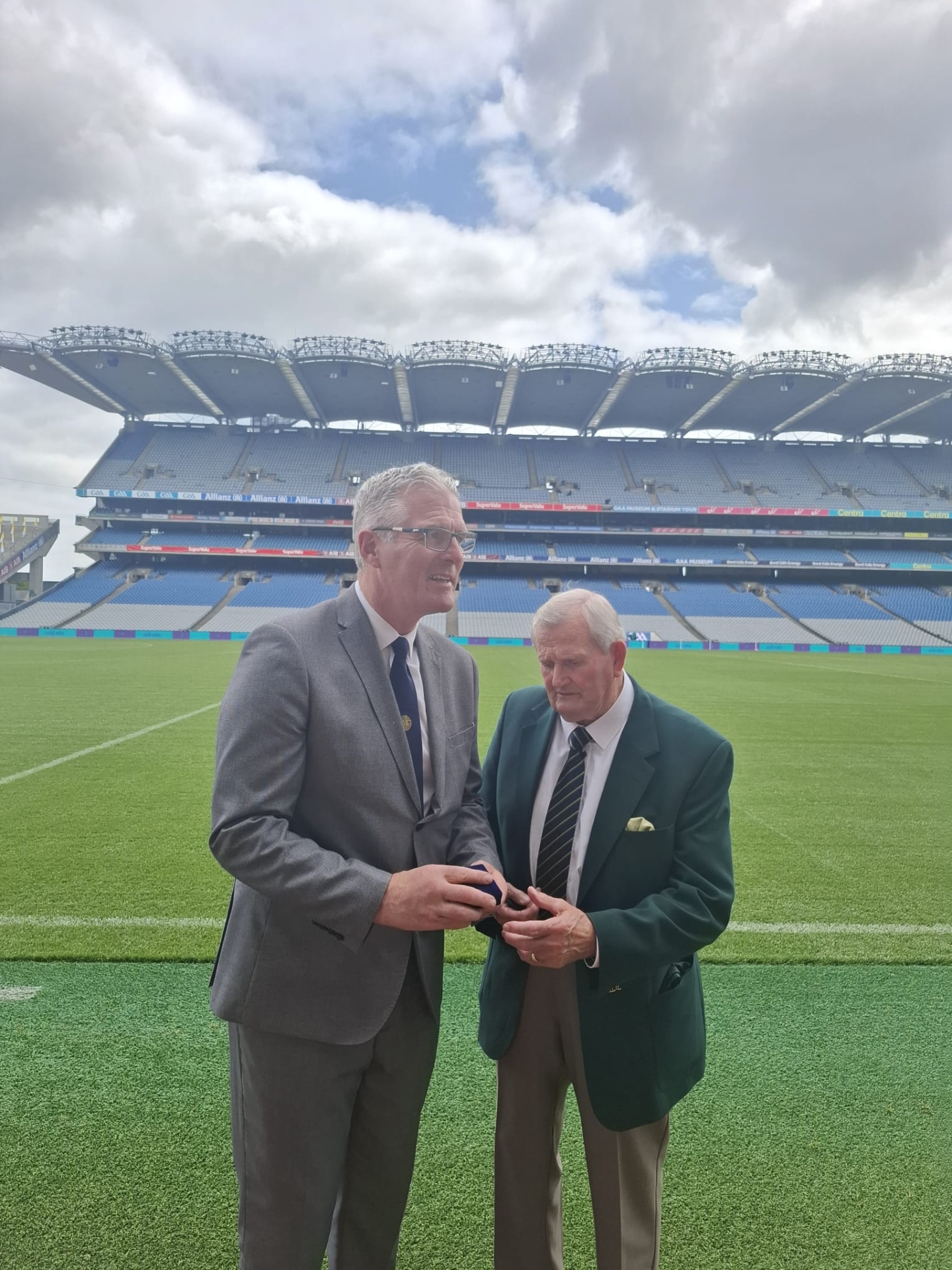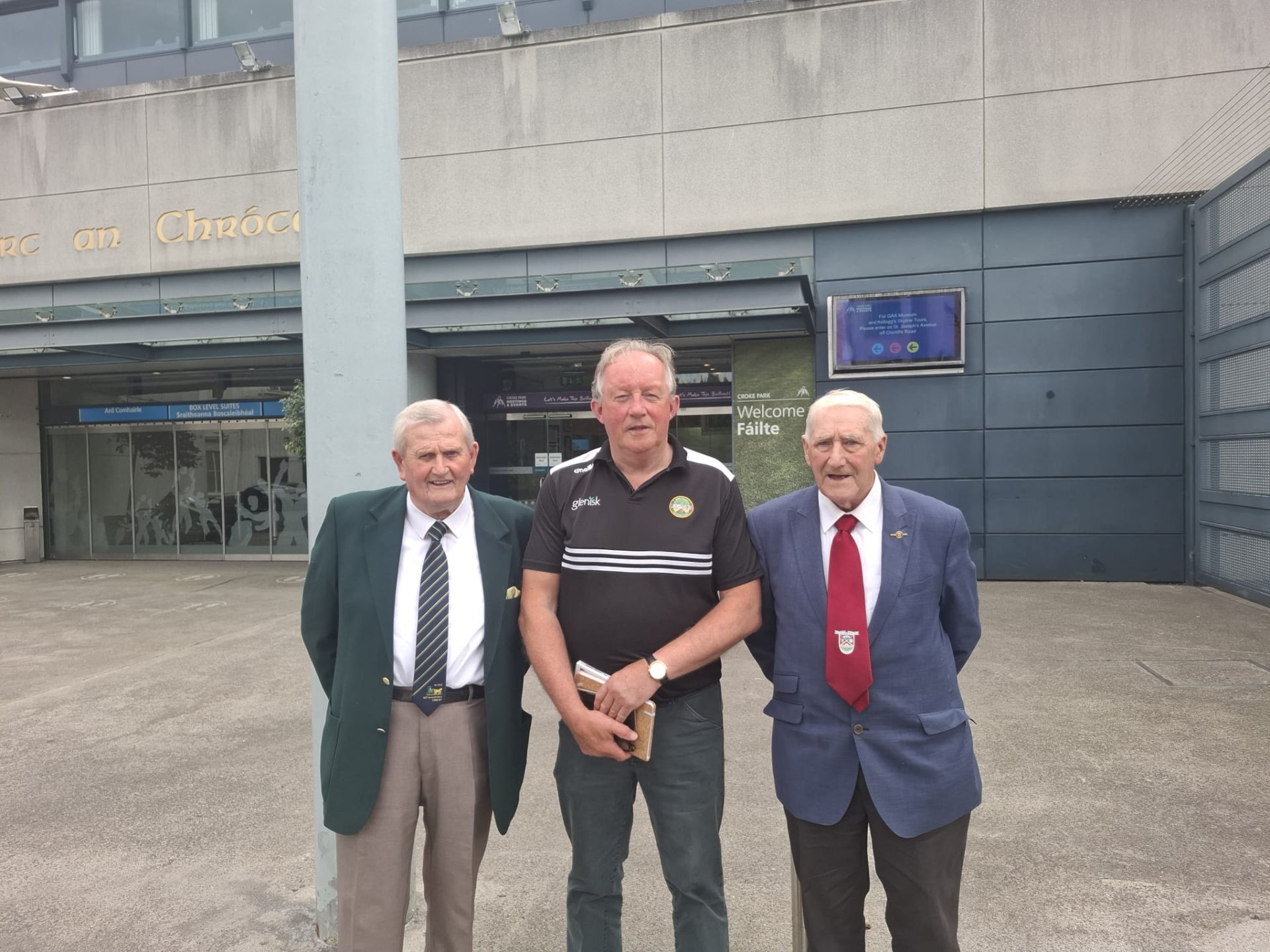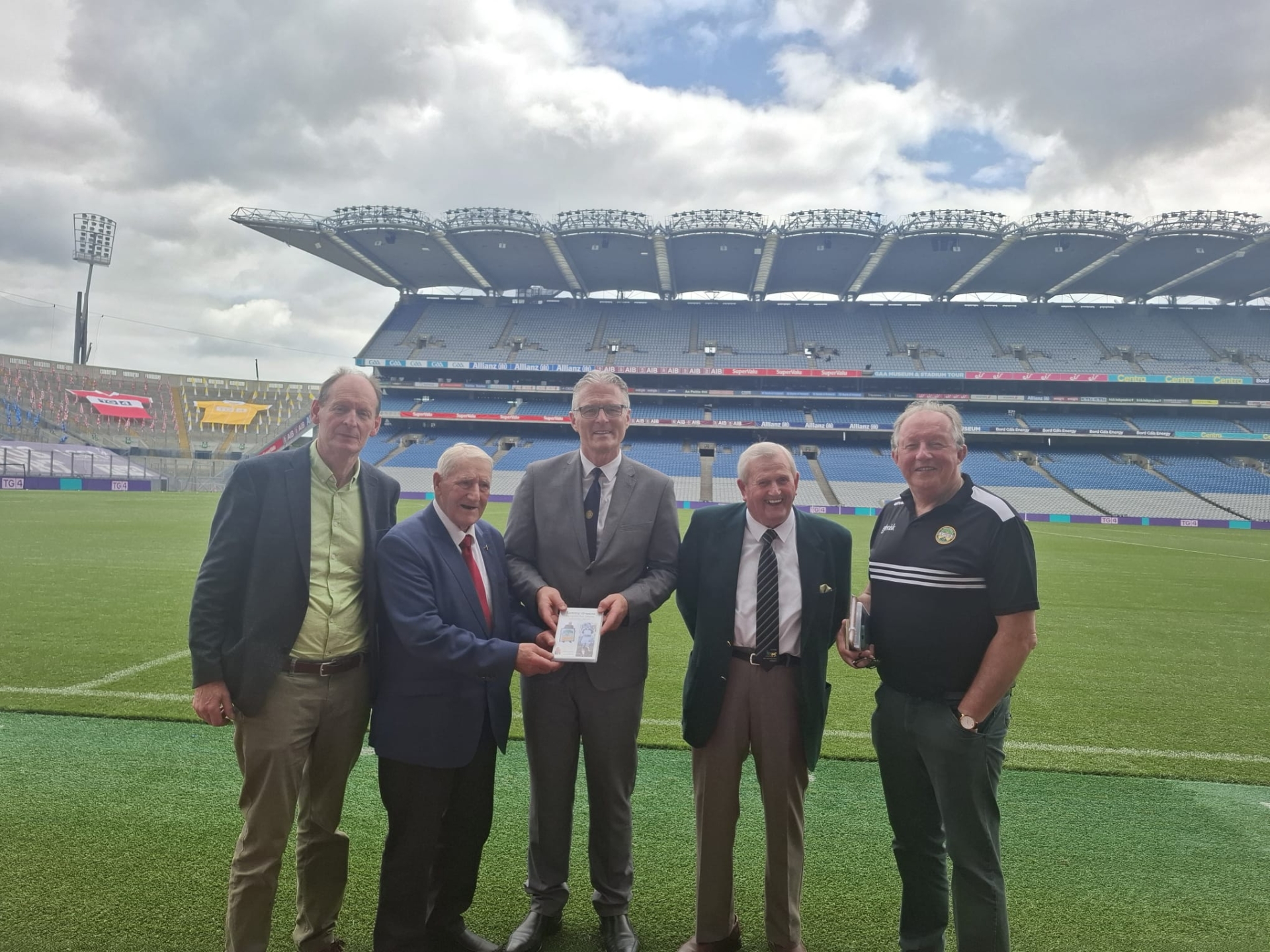
Tommy Greene, Jarlath Burns, Paddy McCormack and Tom Parlon in Croke Park on Thursday.
65 years to the day of one of Offaly's most important and iconic successes, GAA president Jarlath Burns gave a powerfully genuine and emotional welcome to two of the county's greatest heroes in Croke Park on Thursday afternoon.

The Offaly team in 1960
Brought through a dressing room area out onto a pitch in a stadium that bore no resemblance to the throbbing ground they ran out onto with nerves fluttering, tension sky high on July 31 1960, football icons Paddy McCormack and Tommy Greene rekindled golden memories of a never to be forgotten day with the Armagh man.
One of the toughest defenders to play the game, Paddy McCormack and one of the star forwards of that great team, Tommy Greene were among the heroes as Offaly edged out Louth to capture the Leinster Senior Football Championship for the first time, 0-10 to 1-6 – Offaly had started the day brightly with a win over the same opposition in the Leinster minor football final, 1-12 to 1-5, going on to lose to Galway to in the All-Ireland semi-final.
That was a day that changed everything for Offaly GAA, arguably the most important in the county's great history. It was the county's first Leinster senior championship title and it provided the springboard for an incredible four decades – followed by a breathtaking resurrection at underage level in the past few years.
Offaly had won the Leinster Minor Football Championship earlier that afternoon and the seniors followed with a nerve tingling win over a Louth team who were then a powerful force, having won the All-Ireland in 1957.
Offaly were beaten by Down in the All-Ireland semi-final that year and went to the All-Ireland final the following year, losing out to the Ulster men in a long remembered shootout in front of a record attendance of 91,000 at Croke Park. That great Down team broke the mould for Ulster but they had a ferocious job to get over Offaly – the 1960 All-Ireland semi-final went to a replay and those meetings were long debated in Offaly for a questionable penalty given to Down's James McCartan in 1960 and a cast-iron one not given to Tommy Greene in 1961.

Jarlath Burns and Paddy McCormack examining Paddy's 1960 Leinster medal
While that Offaly team didn't go the whole way, they also broke the mould for the Offaly. Their achievements inspired a group of extraordinary young players to win the All-Ireland Minor Football Championship in 1964 and they provided many of the heroes that made the ultimate breakthrough, winning the All-Ireland Senior Football Championship in 1971 and 1972.
A third All-Ireland senior football title followed in 1982 while hurling reached the promised land in 1980 with a first Leinster senior title, followed by All-Ireland's in 1981, 1985, 1994 and 1998. While the 1960s and '70s were primarily about football, their achievements ignited the county as a whole and hurling heroes from 1980 and 1981 have acknowledged the positive influence their wins had on them – they showed that Offaly could win and one thing led to another in both codes with big underage wins thrown into the mix.
Offaly came out of it all with a reputation as one of the country's great dual counties and in many ways, their story transcends Cork and Galway who have a much bigger population base and area. When John Troy got a hurling All-Star at centre half forward in 1999, Offaly became the first county to have an All-Star in every position in football and hurling. Offaly's scintillating win in the 2024 All-Ireland U20 Hurling Championship meant that they joined Cork and Galway as the only counties with the “holy grail” collection of All-Ireland Senior, U21/20 and Minor Football and Hurling Championship wins in both codes.
The Offaly story is one of the great, heart-warming ones in the GAA and no matter what way we compare the importance of the many crucial wins, there is one indisputable fact: the tradition started with the 1960 heroes, they were the first to break through ancient barriers and everything else flowed beautifully from there.
Thursday's occasion was a very evocative one. With Offaly GAA chairman Tom Parlon present, along with a nephew of Tommy Greene, John Gallagher who presented Jarlath Burns with a DVD detailing his career, the duo rekindled a host of great memories from those years. Armagh man Burns gave them a great welcome, enjoying the stories, telling ones of his own about a variety of topics, giving honest and open views and clearly enjoying this unique trip down memory late. He enjoyed looking at pictures from that year that Tommy Greene had and was clearly impressed when Paddy McCormack produced his 1960 Leinster medal from his pocket.
The president paid a tribute to that Offaly team: “1960 is a very significant year when you are from the north because it was the year Down won the All-Ireland. Armagh had won a junior All-Ireland in 1926 and we always say we were the first to bring a cup across the border but Down were the first to bring Sam Maguire. It was a massive, massive event and obviously Offaly was involved.
“History is very important to the GAA. You can see where we are here (the GAA's Management Committee meeting room) with pictures of every president of the GAA. In the GAA, we say that the past is the present and the present is the future. We are relying on people to talk to us about the past and remember the past for us.”

Paddy McCormack, Tom Parlon and Tommy Greene outside Croke Park on Thursday
Paddy McCormack went down in history as one of Offaly's greatest ever footballers. Known as the “Iron Man from Rhode”, he achieved national fame for his take no prisoners approach in the Offaly full back line but actually started his county career as a corner forward. He played in the attack for Offaly senior footballers in 1959 and it was only in 1960 that he formed the legendary full back line along with John Egan of Doon and Cloghan's Greg Hughes at full back. They held the fort there throughout the 1960s but McCormack was the only man standing in 1971 and 1972, now full back – Hughes was a sub in 1971 while Egan had retired.
Synonymous with Rhode GAA Club, with whom he won a handful of senior football medals, and a life president there, he was a native of Croghan and was actually playing with St Brigid's GAA Club there from 1960 to 1964 during a self imposed sabbatical from Rhode, before returning to star for them into the 1970s. An eye injury ended one of the great footballing careers in 1973 and McCormack and Greene both showed their affection for their own clubs by proudly displaying Rhode and Daingean club ties with crests in Croke Park on Thursday.
The memory of the pre-match nerves in 1960 remained with McCormack for years and he recalled: “We were reared in the country as you know and before a game, we used to get butterflies. I was at home and I was getting these butterflies because I was only a gossun at 20 and playing corner back.”
He went down to a neighbour, remarking that there was no such thing as going out on a Saturday night at that time, and told her about his anxiety. The neighbour immediately knew what to do, giving him a spoonful of sugar in turpentine, telling him: “This will cure you”.
“I was lucky it didn't kill me, never mind cure me,” he laughed.
Football was a very physical, no nonsense game at that time and the Rhode man smiled fondly: “I started off corner forward and we played Kerry here in an auld league match. You were hit when you were going for it, you were hit when you got it and you were hit when you were kicking it so that stuck with me until I retired.”
Tommy Greene's county career was over by the time Offaly returned to the All-Ireland final in 1969, losing to Kerry, and he retains vivid memories of so much from 1960 and 1961.
He recalled that he played every position in the attack, regularly switched over if a defender was getting the better of a team mate. “We played Louth in the league every year which meant we knew them. I played on Patsy Coleman an awful lot. We lost to Louth in 1958 and Christy Carroll (Edenderry) came flying in. I gave it to him and he hit the outside of the post. Louth went down the field and got a 35 yard free. Kevin Behan kicked it into the net and Liam Moran (Edenderry) in the goals. The difference of six points. Then they couldn't leave me there, they put me into the corner again. I scored a goal but one goal was no good when you were six points behind. You would lose heart when that was going on.”
He also talked about the large selection committees at that time. “Every senior team had a selector and then junior clubs in north and south Offaly looked for representation and they got it. There were 14 selectors. They all sat in seats behind us,” Greene reflected with McCormack interjecting: “Wasn't it shocking”.
Tommy Greene said they picked new lads every time. “It was like an election, you voted for a lad and you could plan to get your own lad on that way”.
“That is incredible,” commented Jarlath Burns.
“The thing was you could only bring in three subs,” Paddy McCormack noted. He also recalled the penalty James McCartan got for Down in the 1960 All-Ireland semi-final. “McCartan got the ball and came toeing it in. As far as I could see, Greg Hughes stood and did nothing to him. The referee came in and gave a penalty. They drew with us that day and beat us in the replay by two points.”
Tom Parlon was only seven when Offaly won that Leinster title and he has no doubt about the role they played in all future football and hurling success. “They broke the mould. You look at the two All-Ireland's this year. Kerry and Tipperary both had players on the team who had won All-Ireland medals previously and it was a big factor in them winning. In 1960, Offaly had won nothing. These men were pioneers, they came up with great gusto, great confidence. Tough men as well and they were well prepared.
“We have had great success in both football and hurling but I think a lot of it is on the shoulders of these great men who won the first Leinster.”
He remembers his late father having a combine harvester for hire at that time and working unusually on a Sunday. They had an old transistor radio and Parlon remembered them stopping to listen to the match.
From very strong hurling territory in Coolderry, Parlon talked about the impression those big football wins made on them.
“Absolutely. I was going in 1971 and '72. While Coolderry wouldn't field a football team, there would have been massive support there for the Offaly football team. We regarded them all as great heroes and knew them all by name.”
Just five of the 1960 panel are still alive: Paddy McCormack, Tommy Greene, Willie Nolan, Phil O'Reilly and Charlie Wren.
SEE NEXT: Rhode on high alert for big SFC test with Ferbane
The senior team on that epoch making day was:
Willie Nolan (Clara); Paddy McCormack (Rhode, and then St Brigid's), Greg Hughes (Cloghan), John Egan (Doon); Phil O'Reilly (Tullamore), Mick Brady (Edenderry), Sean Ryan (Doon); Sean Foran (Edenderry), Charlie Wren (St Mary's and then, Air Corps in Dublin); Donie Hanlon (captain, Gracefield), Sean Brereton (Walsh Island, Edenderry and Clonbullogue), Tommy Greene (Daingean); Mick Casey (Rhode), Peter Carey (Daingean), Har Donnelly (Air Corps). Subs – Larry Fox (Tullamore), Patsy Hughes (Cloghan), Tommy Cullen (Edenderry), Peter Daly (Tullamore and Ballinamere) and Frank Higgins (Gracefield).
The minor team was: Paddy Merrigan (St Conleth's, Daingean); Jimmy Kelly (Walsh Island, Charlie Daly (St Conleth's and Cappincur), Mick Bracken (Tullamore); Christy McGrath (St Conleth's), Pat Heffernan (captain, Tullamore), Gabriel Hayden (Tullamore); Martin Turley (Gracefield), Brendan Donoghue (St Mary's); Dick Shaughnessy (Walsh Island), Mick Ennis (Tullamore), Ricey Scully (Clara); Noel O'Brien (Clara), Tom Furlong (Tullamore), Joe Wrafter (Tullamore). Sub used – Mick Rouse (Tullamore).
Pictured below: John Gallagher and Tommy Greene presenting a DVD outlining Tommy's career to Jarlath Burns with Paddy McCormack and Tom Parlon

Subscribe or register today to discover more from DonegalLive.ie
Buy the e-paper of the Donegal Democrat, Donegal People's Press, Donegal Post and Inish Times here for instant access to Donegal's premier news titles.
Keep up with the latest news from Donegal with our daily newsletter featuring the most important stories of the day delivered to your inbox every evening at 5pm.